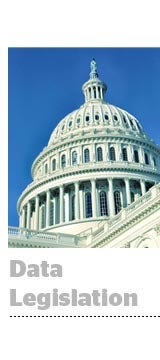
Senators John D. (Jay) Rockefeller IV (D-WV) and Edward Markey (D-Mass.) introduced legislation Wednesday that would require data brokers to be accountable and transparent about the information they collect and sell about consumers, but the direct marketing industry is already pushing back hard.
“Consumers deserve to know what information about their personal lives is being collected and sold to marketers by data brokers,” Rockefeller said in a release. “This booming shadow industry, which generated more than $150 billion in 2012 and operates with very little scrutiny and oversight, is making tremendous profits off practices that can be disturbing and totally unfair to consumers.”
The Data Broker Accountability and Transparency Act of 2014 (DATA Act) aims to give consumers access to files of personal information a data broker compiles, the ability to correct inaccuracies and the chance to opt out of the sale of that data to other companies. The legislation would also empower the Federal Trade Commission (FTC) to impose civil penalties on data brokers that violate consumers’ privacy and trust.
The bill’s introduction follows a December hearing in which Rockefeller singled out data brokers Acxiom, Epsilon and Experian for “continuing to resist my oversight,” a charge each company denied.
Following the announcement of Rockefeller and Markey’s legislation, the Direct Marketing Association (DMA) quickly issued a retort.
“Chairman Rockefeller continues to want to hamstring an industry that is the brightest beacon of American innovation – creating products and services that consumers love and demand – and the engine of the US economic and employment growth – for no good reason,” said Linda A. Woolley, DMA’s CEO and president.
“Time and again, Congress has found that access and correction to consumer data are necessary only when the information is used for eligibility purposes, and marketing is not an eligibility purpose,” said Peggy Hudson, DMA’s SVP of government affairs. “Imposing an access and correction regime on marketing data … would make it harder for companies to keep data secure at a time when consumers are more concerned about identity theft than ever before.”
Hudson also noted that “data is the new gold” and “the fuel that drives the U.S. economy,” adding $156 billion to the economy and fueling more than 675,000 jobs. The unencumbered exchange of data across the data-driven marketing economy helps small business and innovation, the DMA said.
In a statement to AdExchanger.com, a spokesperson for Epsilon, one of the data brokers put on notice by Rockefeller, said, “Epsilon supports transparency and consumer choice and adheres to the responsible collection and use of marketing data for marketing purposes that benefit consumers. Many of the procedures outlined in the bill have long been in operation at Epsilon. We will continue to work with Sen. Rockefeller and members of the Commerce Committee to educate, inform and demonstrate the value that data-driven marketing delivers to consumers through responsible marketing practices.”
AdExchanger Daily
Get our editors’ roundup delivered to your inbox every weekday.
Daily Roundup
Sheila Colclasure, Acxiom’s global privacy and policy officer, also responded to Rockefeller and Markey.
“Acxiom has a long history of proactively engaging with policy makers and advocating for an approach that balances privacy considerations and the benefits of the appropriate use of data,” she said. “We participated, and will continue to participate, in the debate around this legislation — and other privacy- and data-related legislation — that results in a reasonable outcome which preserves the benefits of data use, creates a sustained environment for innovation, and provides meaningful choices for consumers.”
Have Americans “fully embraced a data-driven way of life,” as the DMA puts it? And if so, do they agree that the responsible use and sharing of data for marketing “provides tremendous benefits to the US economy and the American workforce, for small and large businesses, and for individual consumers and society as a whole?”
When the DATA Act comes up for debate, Congress will be called upon to find a balance between personal privacy and free enterprise as technology continues to move faster than the government’s ability to regulate it.












